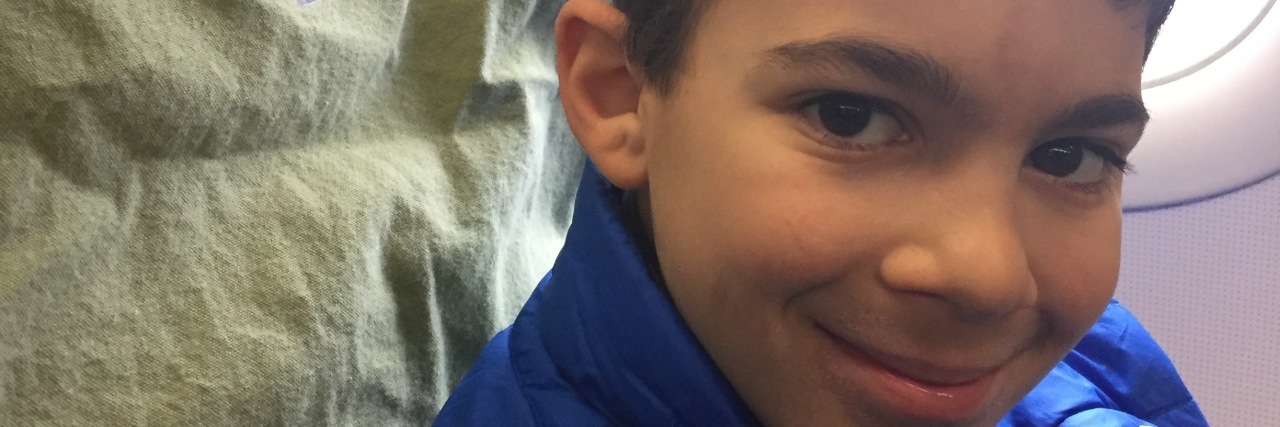What I Want People to Understand About Flying When You Have a Peanut Allergy
My son and I were waiting to board a flight to Sarasota, Florida. JetBlue is our airline of choice because of my son’s anaphylactic peanut allergy. It permits us to pre-board so that I can clean the seating area.
As per usual, my heart is pounding. I know I have only a few minutes before the regular boarding begins, and I need to quickly wipe down his area, including his seat, seat belt, tray table, light switch and surrounding areas. As the rest of the plane begins to board, I spot a peanut under the seat in front of mine and I quickly scope the whole area for additional contaminants, remove them, and place them in a sealed bag. I sit down, and by now, I am sweating profusely and look flustered.
Once all the passengers are seated, it is the policy of JetBlue to create a “buffer zone.” The flight attendants make an announcement to the passengers in the rows surrounding us asking those within this “buffer” area to not consume any peanuts they may have brought onboard. I am usually far more relaxed at this point because JetBlue does not serve peanuts and my fellow JetBlue passengers have always been understanding and accommodating; but not this time.
The man behind us who was traveling with his son, when politely asked to refrain from eating peanuts, exclaimed, “So this entire plane has to suffer because one child has a nut allergy?” We were sitting right in front of him, but he was unaware of that because the airline does not identify the food-allergic passenger. Thankfully, my son was wearing his headphones and did not hear his callous remark. As the flight attendant left, the man continued his ridiculous rant telling his son that people like us should just not fly. This compassionless man said, “suffer?” Being asked to forego a peanut snack choice for a two-hour flight in this father’s eyes is an intolerable “suffering” of such tremendous inconvenience that he felt the need to share his “righteous indignation” with all the immediate passengers and the flight attendant. Teaching your children that not being able to eat peanuts for two whole hours is actual “suffering” clearly explains why there is too little empathy in this world.
“Just don’t fly” are words that evoke a memory for me of a story shared by the father of two peanut allergic children on my website, No Nut Traveler. Lt. Col. Tony Mena provided me with a food allergy-flying scenario I had not even considered — a military perspective. As a career military officer, Lt. Col. Mena’s family often needed to relocate quickly, with air travel being the only option to report to duty on time. He describes his travel experiences as ones filled with frustration and anxiety because of the lack of uniform airline polices with regard to food allergies. Even within the same airline, different crews yield different results.
Lt. Col. Mena states that the most cringe worthy counter-argument he hears is “well just don’t fly if you have allergies,” or “why should your kid’s deadly allergy impinge upon my airline snack?” He said, “Please realize those of us in uniform who have dedicated our lives, and the lives of our families, to serve our country rarely have the luxury to ‘just not go.’ We report to duty as ordered and only ask for safe passage. For the sake of my children’s lives, I’ll gladly trade you some Oreo cookies in exchange for those peanut M&Ms, if snacking on an airplane is so important to you. We are not looking for sympathy, just responsible citizenship.”
In today’s global environment, most of us have a need to travel. Travel may be required for work, to get to college, to see a sick or dying relative, or simply for pleasure. Think about what it means to that military family that moves around or the child of parents who are divorced. Flying may sometimes be the only feasible option. Some people are myopically selfish on the small issues without realizing that these very same issues are of tantamount importance to others. It’s unfortunate that these people do not realize that empathy and compassion will help them bridge this gap. As Lt. Col. Mena eloquently states, the very notion that a United States civilian expects military personnel to fight and die for this country, but that same civilian feels it is an abhorrent abridgment of his rights to forgo peanuts for a few hours on a plane flight, is irrational.
A version of this story originally appeared on Huffpost.

